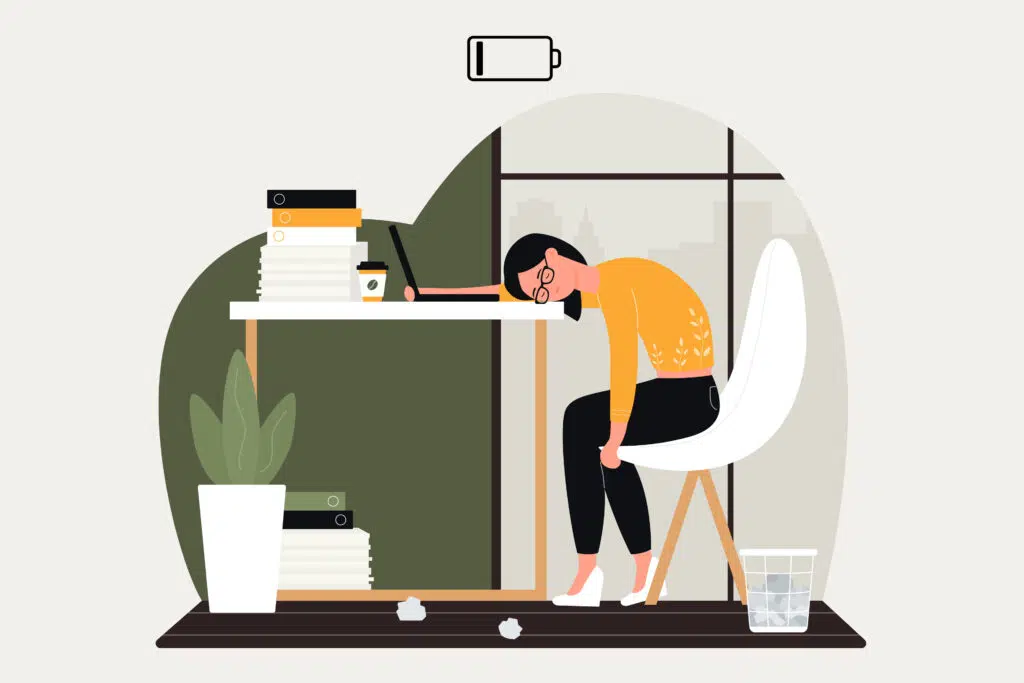A Guide To Managing Depression During Pregnancy For Expectant Mothers

Almost one in five women experience a mental health condition during pregnancy or in the first year after birth, with 9% of women meeting the criteria for major depression. The pregnancy experience is unique. While some people seemingly fly through pregnancy, others can face significant mental health challenges. In this article, we talk about how to manage depression during pregnancy and where to turn for help.
What Is Antenatal Depression?
First, it’s important to know that experiencing a wave of emotions during pregnancy is entirely normal. Between the hormonal rollercoaster, immense physical and personal changes, and grappling with fears of childhood, parenthood, and more, there is a lot to deal with. There’s no denying that pregnancy is a life-changing journey, and preparing for a new transition is challenging.
Antenatal depression is when you experience ongoing symptoms of depression during pregnancy. Some changes in mood and energy levels during pregnancy are normal, but, if antenatal depression symptoms are persistent (for at least two weeks) and affect your ability to function, getting help is essential.
What Are The Signs And Symptoms Of Depression During Pregnancy?
Symptoms of depression during pregnancy include:
- Trouble sleeping or sleeping more than normal
- Feeling very tired
- Feeling hopeless, guilty, or worthless
- Difficulty paying attention and concentrating
- Loss of appetite and losing weight, or increase in appetite and gaining weight (more than usual)
- Depressed or low mood for most of the day, often
- Loss of interest in activities you previously enjoyed
Thinking about suicide and death is a sign of depression. If you’re thinking about harming yourself or are in crisis, seek help immediately. The 998 Suicide & Crisis Lifeline provides 24/7 support for people in distress.
So, what is the difference between antenatal and postnatal depression?
Antenatal depression, also called prenatal depression, occurs during pregnancy. Postnatal depression or postpartum depression specifically happens in the weeks to months following delivery. Perinatal depression includes prenatal and postnatal depression, as the word “perinatal” refers to the time you get pregnant to after the birth.
Will My Depression Affect My Baby?
According to the American College of Obstetricians and Gynecologists (ACOG), untreated depression during pregnancy has been linked to a number of problems, including:
- Health complications for the baby after birth
- Going into labor early
- Small birth weight for the baby
Having untreated depression can also make it harder for pregnant individuals to take care of themselves, get enough rest, and attend checkups. You may find it difficult to make healthy food choices or have the energy to look after yourself. It can also increase the risk of postpartum depression.
One study of more than 7,000 pregnant women found that depression during pregnancy was associated with the following:
- An 82% increase in the risk of premature birth
- A 28% increase in the risk of low birth weight
What Are The Triggers Of Antenatal Depression?
Mental health problems during pregnancy are complex and don’t always have a clear cause. For many individuals, a combination of risk factors can contribute to depression during pregnancy, including:
- History of depression
- Major life events or stress
- Lack of social support
- Physical and emotional demands of childbearing
- Changes in hormones during and after pregnancy
- Experienced perinatal depression during a previous pregnancy
- Unplanned pregnancy
Pregnancy Depression: Diagnosis and Treatment
With the pressure for pregnancy to be a time of joy, expecting parents may feel reluctant to talk about mood changes or ask for help. Naturally, there’s a large focus on physical health while pregnant, but it’s important to be aware of the symptoms of depression and speak to your healthcare provider about any doubts you have.
Are There Prenatal Tests For Depression?
In a report from the CDC, researchers found that nearly all women asked (99.2%) received prenatal care. Of those who received prenatal care, 79.1% reported being asked about pregnancy during depression.
Screening pregnant individuals for depression can improve outcomes for women and infants. Several organizations recommend screening for depression, including the U.S. Preventative Services Task Force and ACOG. Despite recommendations, studies suggest that screening for maternal depression is not a standard.
There are several screening tools that your healthcare provider may use, such as:
- Patient Health Questionnaire-9 (PHQ-): This is a 9-question tool that focuses on the major depressive symptoms.
- Edinburgh Postnatal Depression Scale (EPDS): Originally designed for postpartum depression, the EPDS is also used during pregnancy.
How Do Doctors Treat Depression During Pregnancy?
Treating depression during pregnancy requires a personalized and tailored approach. Doctors often use a combination of strategies, with the specific choice dependent on the individual and the severity of depression.
Here are some treatment options for depression:
- Cognitive Behavioral Therapy (CBT): This type of therapy helps individuals identify, challenge, and change harmful thought patterns and behaviors that contribute to depression.
- Interpersonal Therapy (IPT): Focuses on improving communication and relationships, which can be especially helpful during major life changes like pregnancy.
- Mindfulness-Based Therapies: Practices that cultivate mindfulness, like mindfulness-based stress reduction (MBSR), may be beneficial.
- Antidepressants: Some medications, such as selective serotonin reuptake inhibitors (SSRIs), may be considered. However, the risks and benefits of medication during pregnancy should be carefully evaluated.
The treatment you choose is entirely your decision. Your doctor is there to help you decide what’s best for you and your baby.
Is It Safe To Take Medication For Depression While Pregnant?
Taking medication for depression is a personal choice and a decision that should be made in consultation with your healthcare provider. Decisions about medication are typically made on a case-by-case basis. Healthcare providers will assess the severity of the depression and weigh the potential risks of depression to both the pregnant individual and the developing baby against the possible risks associated with medication. The specific circumstances of the individual will need to be considered by their healthcare provider.
Self-Care Practices For Managing Depression During Pregnancy
In addition to speaking to your healthcare provider, your doctor may suggest self-care practices to help support your pregnancy mental health and well-being.
Staying Physically Active
Regular physical exercise has been shown to have a beneficial effect on mood. Walking, swimming, or prenatal yoga can help you keep moving. However, it’s essential to speak to your doctor if you’re starting or modifying an exercise routine during pregnancy.
Eating A Balanced Diet
Maintaining a healthy diet and eating a wide variety of foods can contribute to your overall well-being. Eating a healthy and balanced diet provides the nutrients and building blocks for your baby to grow.
Engaging In Relaxation Techniques
Try to take some time to relax and engage in relaxation techniques like mindfulness, meditation, and deep breathing. Whether you’re coping with anxiety during pregnancy or managing depression, relaxation techniques can help you feel calmer.
Keep in mind that these are common self-practices to utilize during pregnancy, but it’s important to consult your healthcare provider for individual and tailored guidelines.
Where Can I Find Help And Support For Depression During Pregnancy?
For help and support with depression during pregnancy, try to reach out to your healthcare provider, including obstetricians, mental health professionals, or perinatal support groups. Here are some resources to consider:
- National Maternal Mental Health Hotline: Call or text 1-833-TLC-MAMA (1-833-852-6262) for free, confidential support and resources 24/7 in English, Spanish, and more than 60 other languages
- National Alliance on Mental Illness (NAMI): Offers support groups, educational resources, and advocacy for individuals with mental illness.
- Mothertobaby: Provides information on the safety of medications and other substances during pregnancy and breastfeeding.
- Thriving Center of Psychology: Find your therapist match using our mental health platform to connect you with highly skilled therapists who formulate a unique treatment plan for you.
If you’re considering speaking to a mental health professional but are unsure what kind of therapist you need or where to start, we can help. Our compassionate therapists provide a safe space to explore feelings and thoughts, help you develop coping strategies, and offer support tailored to the unique challenges of your pregnancy. Book an appointment today with one of our expert therapists for depression.

How to Manage Stressful Life Transitions and Events
From getting into college or having a baby to splitting from a spouse or experiencing the death of a loved one, life can surprise you with big wins and tear you down with loss. Life is filled with transitions, some happy, others stressful and difficult.

How Long Does it Take to Recover From Burnout?
If you’ve reached burnout, it describes a state of complete emotional, physical, and mental exhaustion. Between heavy workloads, toxic work environments, economic uncertainty, and a poor work-life balance, burnout is a very real problem that can affect all aspects of your health.

What is Mindfulness Therapy?
Mindfulness therapy involves using mindfulness techniques to increase awareness and learn to manage emotions more effectively. These techniques include paying attention to the present moment without judgment.

What is Dialectical Behavioral Therapy (DBT)?
Dialectical behavioral therapy (DBT) is a type of talk therapy developed to help people struggling with intense and overwhelming emotions and relationship difficulties.




